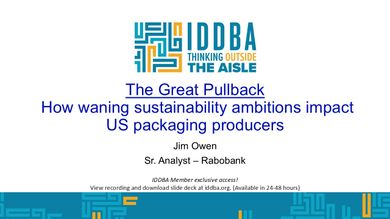Membership Matters Year-Round
365 Days of Benefits are available to our members. From scholarships, to professional development and more!
Become a MemberRenew a MembershipJim Owen
SEP 17, 2025 | Sustainability, Packaging

As the 2025 deadline for packaging sustainability goals approaches, many major US-based consumer brands are quietly retreating from their earlier commitments. In this webinar, Jim Owen, Senior Analyst Packaging & Logistics at RaboResearch Food & Agribusiness will share insights on what’s driving this shift and how it impacts packaging producers. Between 2018 and 2020, a wave of companies spurred by public pressure, NGO initiatives like the Ellen MacArthur Foundation's Global Commitment, and growing environmental, social, and governance (ESG) expectations set ambitious, often voluntary targets to make all packaging recyclable, reusable, or compostable by 2025. While these goals were never legally binding, they became widely recognized as industry benchmarks. Now, confronted by economic pressures, limited recycling infrastructure, and fragmented regulations across US states, companies are scaling back. This shift marks a broader transition from aspirational pledges to pragmatic strategies, where policy, cost-efficiency, and measurable outcomes are taking precedence over idealistic goals. For plastic packaging producers, this recalibration presents both a challenge and an opportunity: a chance to move from being passive suppliers to strategic partners, helping brands navigate a more regulated, performance-driven sustainability landscape.
Log In365 Days of Benefits are available to our members. From scholarships, to professional development and more!
Become a MemberRenew a Membership